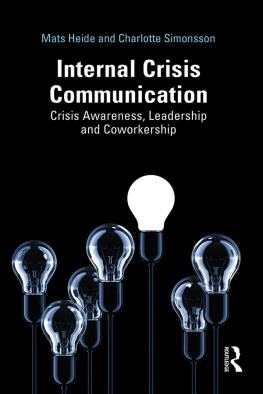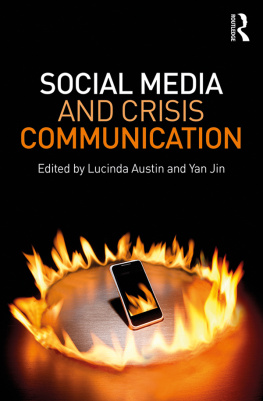Christian Faller, B. A. and Kristof Schmit, B. A. are the founders and CEOs of the German advertising agency deepr, based in Stuttgart. They specialize in marketing and digital strategy for small and midsize companies.
Both entrepreneurs have a degree in advertising and communications from the Stuttgart Media University and several years of overseas work experience in India, Singapore, USA, France and South Africa, among other countries.
). It is a challenging time for marketers as they are trying to adapt to the new way of interaction.
Research, too, indicates that the importance of crisis communications might be at a historic peak. A study from Burson-Marsteller, conducted in 2011, suggests that among business leaders, an overwhelming majority of 79% is expecting a crisis within the next 12 months (Burson-Marsteller 2011: 10). At the same time, most of them acknowledge that the crisis is likely to arise from the online space (p. ).
FIGURE 1: DOES YOUR COMPANY HAVE A CRISIS MANAGEMENT PLAN? (BURSON-MARSTELLER 2011, P.)
This book is going to examine a number of shitstorms, which show that today a brand can stand or fall in a matter of minutes. With marketers and social media gurus alike racing to cope with entirely new demands coming their brands way, the new holy grail of crisis communications is social media crises.
The Problem Outline
This book focuses on a particular sub-area of Crisis Management as part of public relations: social media crises, also known as shitstorms or getting punkd (Owyang 2008). However, this is no research on crisis management tactics or strategies. Instead, it is an attempt to analyze the origins of social media crises, subsequently called their epicenters.
A social media epicenter marks the very beginning of a crisis. It is the place that can be identified as the source of any given shitstorm. This research will be important for various reasons:
- There are more social media crises than ever before
- Theres a severe lack of scientific data
- Businesses expect to be dealing with crises soon
- Research becomes outdated very fast.
There are More Social Media Crises than Ever Before
While corporate crises have been around for many years, social media crises are a relatively new phenomenon since social media itself only emerged over the last decade (King 2010). However, for over ten years, the amount of social media crises has risen steadily (Owyang 2011: 17), and today has a direct impact on the way modern businesses communicate (Burson-Marsteller 2011:31).
Severe Lack of Scientific Data
As mentioned, there is no lack of literature on crisis management in general in fact, its the third most frequently studied topic in the public relations literature (Taylor 2010: 410). However, there are certain areas of social media crises that are largely unexplored. Crisis epicenters are one of those areas.
Even though there are many pundits, it is hard to find scientifically backed-up data on the topic. In 2011, a number of well-respected industry insiders started to mock the state of the social media scene by questioning the competence of self-proclaimed experts (Vaynerchuck 2011). A goal of this book is therefore to shed some light on this important but little investigated field, and create a scientific base for further discussion.
Businesses Expect to be Dealing with Crises Soon
This lack of reliable data is in stark contrast to the fact that businesses are expecting to face crises soon (Burson-Marsteller 2011: 10). Moreover, almost half of the respondents in the Burson-Marsteller study claimed to have increased their internal resources for responding to such a scenario (p. ). This dichotomy evokes the question as to what data those crises response plans have been built on. Given Owyangs statistics that social media crises have steadily risen, one can assume that a considerable part of upcoming crises will either be caused by or be directly linked to social media, and can thus only partly be solved by traditional crisis management knowledge. The research of this book to identify the epicenters of those crises is therefore of high relevance for the industry.
Research Becomes Outdated Within a Very Short Period
In the social media space, facts can change within a matter of days. Therefore, research on crisis epicenters from 2010 might not apply anymore today. Altimeter Group, for instance, found that the epicenters of social media crises have been evenly distributed across all channels until last year (Owyang 2011: 17). This book is going to analyze if these numbers are still accurate or if they require adjustment.
By comparing the results of this research with the older findings, current trends can be identified and evaluated. Through this process, it will become clear if and how the distribution of those epicenters has changed in 2011. On the basis of this, companies may be able to readjust their social media activities in an efficient and targeted way.
The Structure of this Book
This book can be split into two overarching sections: A theoretical foundation and a practical research part.
Introduction
The introduction part is meant to provide an overview over the entire book and the goals that are followed with this line of research.
Theoretical Foundation
First, the broader scope of literature in the field of crisis communications will be reviewed. This includes social media crises as well as traditional crises with a focus on the research that has been done specifically on the origins of social media shitstorms. The first chapter will be wrapped up with a little excursion into the particularly interesting notion of building a pre-warning system.
After this, the scientific methodology that was used for this research will be explained: The Toolbox.
To complete the theoretical part, some workable definitions will be defined that will be referred to throughout the rest of the book. This includes the buzzwords social media and influencers, and a detailed differentiation between social media crises and traditional crises.
Practical Research
The practical research part of this book is based on a selection of 30 social media crises that occurred during 2011. In the beginning, the parameters for which this panel is going to be analyzed will be explained. This also covers a brief outlook over all the channels which are going to be monitored in detail.
After this, the cases will be introduced with a brief explanation of their background. This includes our motives for choosing each particular case. The following actual research wont be recorded as a process but only in the form of the findings.
The major part of this book contains the results of the analyses. The findings will be laid out in an infographic, in order to make the results easier to understand and apply in practice. The results will make a statement about the following questions:
- Channels where the crises originated
- Triggers of the crises
- Causes of the crises
In a next step, those findings will be measured against existing but older results to see if any trends can be identified based on the new insights. For the comparison, the results of Owyangs Altimeter study Social Readiness: How Advanced Companies Prepare will be used (Owyang 2011).










